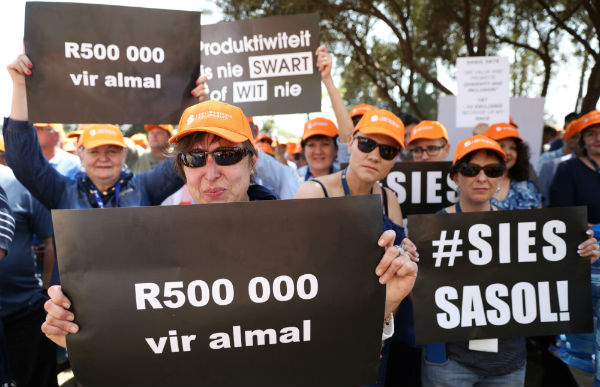About 6,300 employees will stage go-slow: Union

SECUNDA, South Africa (Reuters) — Thousands of workers from South Africa’s mainly white Solidarity union staged a strike at Sasol’s flagship fuel plant in Secunda on Thursday over a share scheme offered exclusively to black staff.
The energy company — which is the world’s leader for making motor fuel from coal — produces fuel at the Secunda plant located about 150 kilometres east of Johannesburg.
About 5,000 of the union’s members clad in orange T-shirts and caps marched to the fuel plant’s gate and held a rally. Many of the workers were accompanied with their wives and children, and some barbecued meat for their colleagues.
“What Sasol is doing, is unfair to workers ... Workers have reason to be angry for being excluded by Sasol because of a principle exclusively based on race,” Dirk Hermann, Solidarity’s chief executive, said in a statement.
Hermann said the union’s 6,300 members at Saso will now stage a go-slow to put pressure on Sasol to respond.
Apartheid, which ended in 1994, created enduring disparities of wealth that favored the white minority. Solidarity’s action however, is on a specific issue relating to Sasol, with limited implications for wider social issues.
Sasol has said it implemented the scheme in line with a requirement that South African companies meet quotas on black ownership, employment and procurement as part of a drive to reverse decades of exclusion under apartheid.
Meeting the rules makes a company more likely to qualify for government tenders.
The company has sold 25 per cent of its local operations to qualifying black employees, a foundation and the black public in a 21 billion-rand (US$1.4 billion) deal financed by the company and backed by its shareholders.
Solidarity, which has been waging a challenge against racial quotas in the workplace, has said the scheme was discriminatory.
The Commission for Conciliation, Mediation and Arbitration, which mediates in labour disputes, ruled that Solidarity did not have a legal right to challenge Sasol’s scheme in court, but could push its cause through industrial action.
The strikers at Secunda blared music in the Afrikaner language, and waved placards saying: “Stop rasverdeling by Sasol,” which translates to “Stop racial division by Sasol” in English. Another said “Velkleur bepaal nie my waarde nie” or “Skin color does not determine my worth.”
Sasol, which employs around 26,000 people in South Africa, said it had made contingency plans at its facilities.
Alex Anderson, the company’s spokesman, said operations at its Secunda plant, part of which is undergoing scheduled maintenance shutdowns, were not interrupted by the strike.




